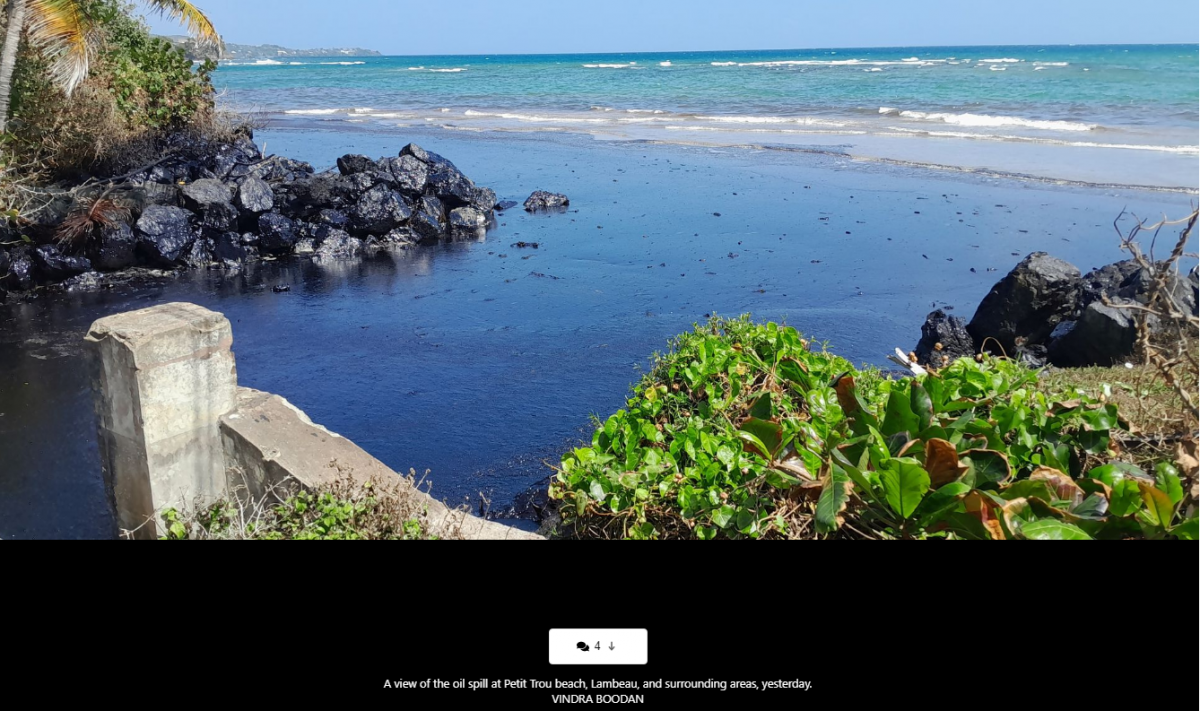(Trinidad Guardian) Minister of Works and Transport Rohan Sinanan is denying allegations that the Government has been withholding critical information from the Tobago House of Assembly (THA) regarding the Tobago oil spill.
On Wednesday afternoon during a media briefing, Chief Secretary Farley Augustine suggested the Government may have withheld critical information it had on the vessel in the early stages.
In a media release yesterday, Sinanan said his ministry and other arms of Central Government had been working closely with the THA to address the situation.
Sinanan said immediately after the oil spill was reported off the coast of Tobago on February 7, “the administration immediately reached out through its various arms to the Tobago House of Assembly to offer assistance”.
“As Minister of Works and Transport, I, in conjunction with the Minister of Energy and Energy Industries, visited Tobago on February 9, 2024, to hold discussions with the Chief Secretary. I further visited Tobago on February 11 and 14, 2024, to ensure that all necessary assistance was being provided. Additionally, I, along with other ministers, have been in daily contact with the Chief Secretary,” he added.
But while Sinanan thought it necessary to respond to Augustine, the Minister of National Security took a different position.
On Wednesday, that ministry, via a media release, said two vessels, the Gulstream and Solo Creed, were involved in the incident.
However, Augustine felt the Office of the Chief Secretary was disrespected by Government’s failure to send official correspondence to the THA regarding the vessel’s identity before releasing a public statement.
Asked if he had any response to the claims, Hinds curtly said, “No.”
However, he added, “For my part, what is of primary consideration for me, is that investigations are ongoing, collaboration with our regional and international partners are ongoing and I am satisfied that the matter is being properly attended to on the basis of the best information that is available to us.”
Augustine also alleged he received unconfirmed information that the owner of the vessels in question was in contention to purchase the Petrotrin refinery in Pointe-a-Pierre.
Guardian Media yesterday sought further clarification from Augustine on that statement but he explained given the information he received, he sought to ask the question publicly.
The Oilfield Workers’ Trade Union (OWTU), through its company Patriotic Energies and Technologies, bid for the refinery three times and in one instance, had included commodities company Trafigura as an element of the transaction to sell the crude produced.
At no time, however, was Trafigura in line to solely acquire the mothballed refinery.
All attempts to reach Minister of Energy Stuart Young were unsuccessful.
The State’s response to the oil leak left much to be desired, says energy expert Anthony Paul.
Speaking with Guardian Media, Paul said, “I think certainly, from the minute things appeared on social media, the National Oil Spill Contingency Plan should have been triggered. And there is a whole mechanism of communication like a war-room command centre set up. But even before they got to that stage, they could have gotten the people on the ground to act. So that initial movement was quite slow in my view, and I agree with the notion that we are too long in this game.”
He, however, admitted, “Once it escalated and the Minister of Energy got involved, the mechanism kicked and kicked in well I think but I think that initial delay was a little bit worrisome for me.”
Paul said he also anticipated a faster reaction from the Trinidad and Tobago Coast Guard (TTCG), as that arm of national security is an integral part of the National Oil Spill Contingency plan.
Paul also lamented that the Government ministers have taken the lead on this matter.
“There’s a sense that the politicians try to run everything themselves. And it should not have been the minister to respond. He should have come after the technical team had arrived. So, the problems are much deeper than the symptoms you are seeing. The ministry has the Chief Director of Operations responsible for that, the Permanent Secretary would have gotten involved too. The minister probably went at the right time he was supposed to go but somebody should have been there two days earlier. The system is broken,” Paul explained.






